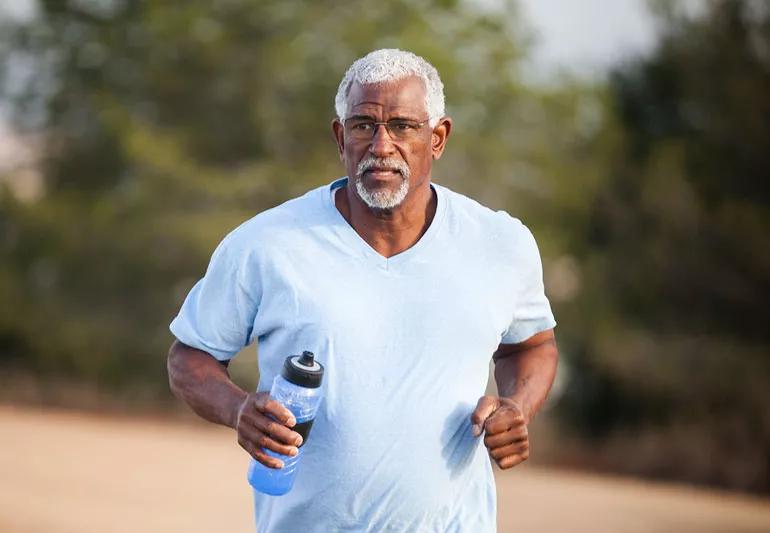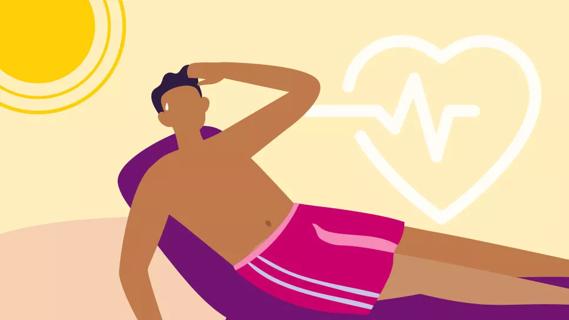Aging poses unique challenges in higher temperatures

For many of us, the warm weather months are a great time to be outside. You may enjoy evening strolls, gardening,
exercising and other outdoors activities during warm days.
Advertisement
Cleveland Clinic is a non-profit academic medical center. Advertising on our site helps support our mission. We do not endorse non-Cleveland Clinic products or services. Policy
Aging, however, can pose challenges when you’re hanging out in hot weather. Geriatric specialist Ronan Factora, MD, says this is not only because it’s harder for you to regulate your body temperature as you age, but also could be related to the medications you take.
As you age, it’s often more difficult to recognize when you’re thirsty. This change combined with a normal reduction of water in your body increases your likelihood for dehydration. If you take diuretics such as furosemide (such as Lasix®) or a combination diuretic/beta blocker like hydrochlorothiazide or propranolol) for other health conditions, these also reduce excess fluid in the body. As the temperatures rise outside, these medications can result in real problems for older adults, who may also struggle with dehydration to begin with.
Additionally, you don’t sweat as much when you’re older as when you were younger, so it’s harder for your body to cool itself when your core temperature rises. Dr. Factora says this can be magnified by taking medicines such as oxybutynin or tolterodine, which are prescribed for overactive bladder, but also impair the ability to sweat. “If you can’t sweat, you lose some of your natural ability to control your core temperature,” he says.
Advertisement
The inability to regulate temperature and a decrease in sweating can contribute to symptoms of lightheadedness and dizziness. “When your body’s ability to cool itself becomes significantly hindered, the risk for heat stroke increases,” says Dr. Factora.
There are a host of medications to watch out for during the heat of the summer. These include blood pressure medications, medications for enlarged prostate such as tamsulosin, and those medications mentioned above.
In particular, orthostatic hypotension, which is a reduction in blood flow to the brain caused by moving from lying down to standing or sitting, can lead to dizziness and increased risk of a fall. “For many older adults, this fall can lead to a fracture and can become a serious event,” says Dr. Factora.
Here are a few suggestions to prevent complications due to warm weather:
“My general advice is to enjoy the outdoors. It’s a great way to keep active,” says Dr. Factora. “But be aware of the signs of heat stroke and how to prevent it.”
Advertisement

Sign up for our Health Essentials emails for expert guidance on nutrition, fitness, sleep, skin care and more.
Learn more about our editorial process.
Advertisement

Sizzling temperatures force your heart to work much harder

Both heat illnesses can be life-threatening if left untreated

Anyone can get heat illness, so watch for signs that you need to cool down

The little blue pill might help with physical arousal, but there are better treatments for low libido in women

Most antihistamines, like Zyrtec, are OK, but avoid decongestants for at least the first trimester

This diabetes medication can treat obesity, but it’s not for people who just want to drop a few pounds

Weight loss may cause loose, sagging skin and muscle loss to your rear

Rapid weight loss from the medication may decrease your overall muscle mass

Even small moments of time outdoors can help reduce stress, boost mood and restore a sense of calm

A correct prescription helps your eyes see clearly — but as natural changes occur, you may need stronger or different eyeglasses

Both are medical emergencies, but they are very distinct events with different causes